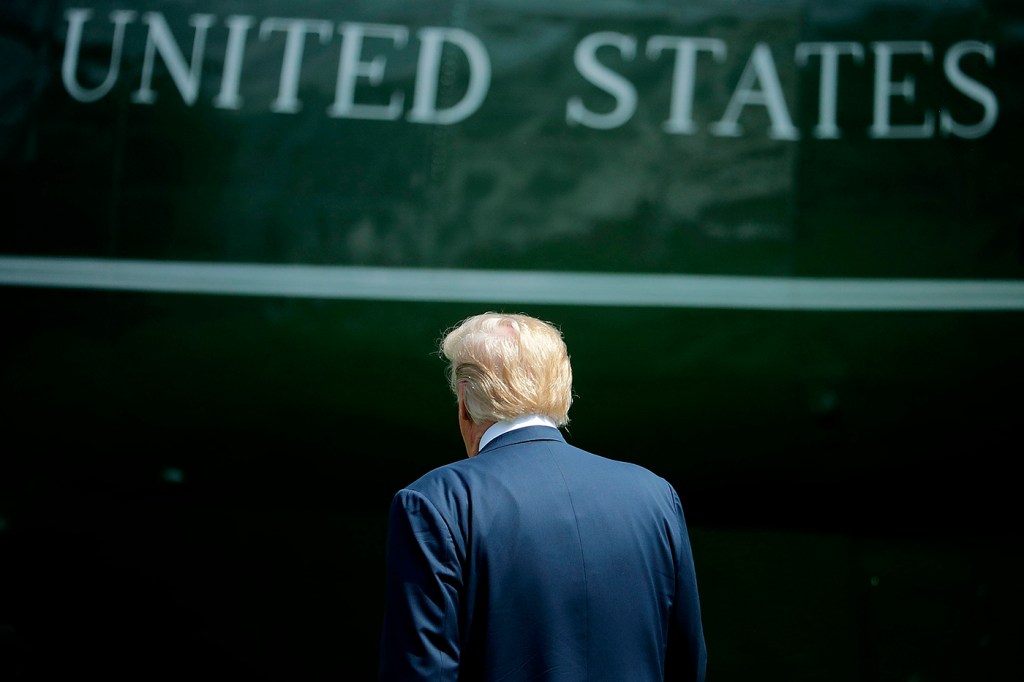Donald Trump says he has the ‘absolute right’ to pardon himself. Would that even be legal?

On Monday, President Donald J. Trump tweeted that he has the “absolute right” to pardon himself, adding that he wouldn’t do so, however, because he’s “done nothing wrong.”
Trump was responding to special counsel Robert Mueller’s investigation into whether his campaign colluded with Russian agents during the 2016 election and potential obstruction of justice.
The president’s tweet was in line with a similar statement by his legal advisor, Rudolph Giuliani, who said Sunday that Trump “probably does” have the power to pardon himself, but won’t.
Northeastern constitutional law professor Martha Davis, however, argues that “any attempt at a self-pardon by the president would have to meet the standard of the ‘take care’ clause of the Constitution, which requires that the president ‘take care that the laws be faithfully executed.’”
“It would be difficult, if not impossible, for the president to establish that a self-pardon met this standard if the criminal investigation and indictment were lawfully conducted, as the current investigation indisputably has been,” Davis says. “There might be hypothetical situations where a presidential self-pardon would be permissible under the take care clause, but that’s certainly not the situation we have here based on the known facts. At some point, one has to wonder why this president is so reluctant to accept the rule of law.”
The question over whether a sitting president has the Constitutional right to pardon himself isn’t new. It came up last summer when Trump asked his advisors about his power to “pardon aides, family members, and even himself” in connection with Mueller’s investigation.
Davis says that the Constitution’s language is silent on whether a president can pardon himself. Some legal scholars argue that the absence of a clear prohibition indicates that the power is so broad that a president could indeed try to take such action.
Whether that move would stand up to Supreme Court examination is an entirely different matter.
A power for kings
Since the presidency of William McKinley, (the earliest for which statistics are available from the federal Office of the Pardon Attorney), there have been more than 20,000 executive pardons granted, but none for a sitting president.
The section of the Constitution that addresses executive pardons is short. Found in Article II, Section 2, it reads, “The president…shall have power to grant reprieves and pardons for offenses against the United States, except in cases of impeachment.” That’s all.
Davis notes that the drafters of the U.S. Constitution borrowed liberally from the Massachusetts Constitution, which had more explicit limitations for executive pardons, specifying that they could only be issued after a conviction.
“The Massachusetts language adds support to the position that the pardoning power in the U.S. Constitution is very broad, since the founders had this more limited language in front of them but instead drafted a broader provision,” Davis says.
The thing is, the framers of the Massachusetts Constitution also borrowed from the origins of pardoning power, which date back to a 7th-century statutory provision defining the power of Anglo-Saxon kings of England, Davis says.
And yet, no one in the subsequent 1,500 years has clarified the exact limitations of this power—until now—because the legal framers never imagined that an executive might feel the need to use it for himself.
“When the framers borrowed this concept from England, it was simply not contemplated that the president might use the power to pardon himself,” Davis says. “It would be such a despotic act that it thankfully has not come up in this country before.”
And the Supreme Court says…
While the letter of the law is broad enough that it doesn’t specifically prevent Trump, in this case, from trying to pardon himself, it’s likely that such an action would be challenged in the Supreme Court. The justices would have to closely examine the history of the pardoning power to determine what the Constitutional framers intended when they drafted it.
“The president can fashion anything he wants as a pardon, but whether or not it stands up in court is the real question,” Davis says. “There’s a strong possibility that the court would find inherent conflict in the act of pardoning oneself that goes against basic principles of limited government and fairness that were primary motivators of the Revolution and the constitution’s drafters.”
Bringing such a case to the Supreme Court, Davis says, would create “tremendous chaos in government.”
But there could be a workaround.
The 25th Amendment of the Constitution provides a mechanism for making the vice president “acting president” if the president is unable to carry out his duties.
This means Trump could conceivably declare himself “unable to discharge the powers and duties of his office,” by submitting a written declaration saying as much to the president pro tempore of the Senate and speaker of the House. This would make Vice President Mike Pence acting president. In that position, Pence could pardon Trump, who could then resume his office upon submitting a written “declaration to the contrary.”
“That might still be an abuse of power, but would comply more clearly with the concept of the pardon and with the particular mechanisms laid out in the Constitution,” Davis says.





